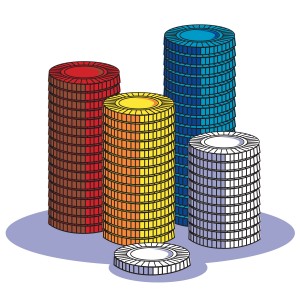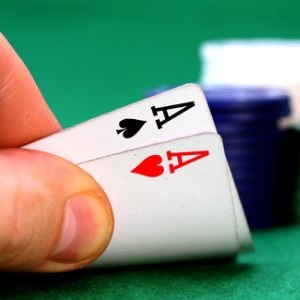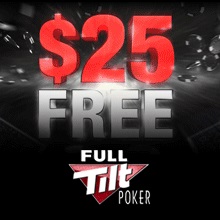It depends on the player
I read an article recently that reconfirmed to me why playing the online Sunday major tournaments is such a good value. The author of this particular article had won a $24 satellite into a $535 event. Once the bubble broke, the author explained that he was focused on the next pay jump. His explanation was that a pay jump of $500 represented a tremendous increase in his equity, given his initial buy-in of only “$24.”
This is obviously not the best mental approach to take for a tournament. How much a tournament costs to enter and how much you have won already really shouldn’t affect your decisions. There is another way to think of tournament value. Assume that there are 100 players left in a tournament, with $100,000 remaining in the prize pool, and you have an average stack. At this point in the tournament, your stack is worth approximately $1,000 — no matter if the buy-in was $10, $100, or $500.
Your only job at this point is to maximize your return on your $1,000 equity in the tournament.
Going back to our satellite winner, his article discussed an important concept: You should always play your own game; don’t let others affect you, and play to your best abilities within the confines of your own game. I don’t disagree with this concept. However, the author failed to point out that his biggest mistake was playing the satellite tournament in the first place. You should never play a satellite if you will be in over your head should you win the satellite. This player won a $24 satellite into a $535 tournament, in which he was playing against superior opponents and for prize money that would strongly affect optimal play.
Let’s look at a little math. The odds of winning the satellite are 1-in-25 for the average player. Once you win the satellite, the odds of cashing in the big tournament are 1-in-10. Therefore, the odds of actually showing a profitable return are 1-in-250 — which is not exactly low-variance. This means that you need an average cash of $6,000 in the big tournament to break even in the long term.
This player had earned $2,400 and was hoping to increase his payday to $2,900 by folding his way to the next pay jump. When he does cash with this type of strategy, he will rarely make it deep enough to cash for more than $6,000. He is getting a return of 100 times his investment, but the odds of him even making it that far are 250-to-1. His biggest mistake was entering the satellite to begin with.
What should be your approach to satellite tournaments? Satellites are great when you are comfortable with playing at the buy-in level of the tournament for which you are trying to win a seat. If not, you are likely to be playing in a lose-lose situation. Sure, it’s great to have a chance to take a shot, but the cost of this shot is quite high.
What makes the World Series of Poker main event so great is that so many players win satellites to get into it. Once they get there, they do not understand deep-stack play, they play too conservatively on the bubble, and if they make the money, they become too concerned with the next pay jump. One year in the main event, when I cashed, we were close to the bubble when a player announced to the table that he was going to play only a pair of aces. A little while later, he raised, so I reraised, thinking I could get him to fold everything except maybe A-A or K-K. He pushed all in. I put on a little show for a while, with all intentions of folding, when my opponent actually flashed me his cards — A-A! He didn’t want me to call. The biggest tournament of the year is so profitable because there are so many players who are uncomfortable with the high stakes of a $10,000 buy-in event.
Generally, I play satellites for only one of two reasons: (1) They give me a good return on my investment when I plan on playing the event anyway, or (2) There is some type of trip involved that interests me, and the satellite field is quite weak. Most players really shouldn’t be playing in too many satellites to “take a shot,” as it is quite rare that they will actually show a decent return.
Submit your review | |






